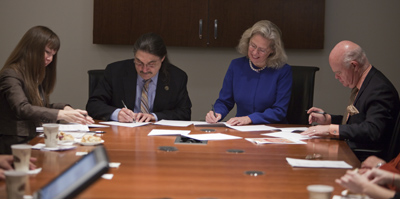
A new partnership between the California Rural Indian Health Board and UC Davis Cancer Center will expand cancer education, outreach and awareness among American Indians.
Posted Jan. 19, 2011
UC Davis Cancer Center and the California Tribal Epidemiology Center (CTEC) of the California Rural Indian Health Board have signed an agreement to collaborate on various initiatives to strengthen cancer education, outreach and awareness among American Indians.
The partnership, formally established Wednesday, Jan. 12, during a memorandum of understanding signing ceremony, will allow for collaboration on cancer prevention and control research, outreach program development, undergraduate and graduate student research, scholarships and training for American Indians.
The two entities will apply for grants to study American Indians in California and their experiences with cancer, including barriers to prevention, early diagnosis and treatment. They also plan to research interventions that address cancer risk-factors.
"Formalizing this partnership between the UC Davis Cancer Center and the California Tribal Epidemiology Center gives both organizations the opportunity to significantly reduce cancer health disparities among American Indians through collaborative education, research and training," said Marlene von Friederichs-Fitzwater, director of the cancer center's Outreach Research and Education Program. "And this represents another milestone in our ongoing relationship with the California Rural Indian Health Board."
Thomas Kim, a physician and medical epidemiologist with the CTEC, said the agreement will allow for a major focus on two issues, often related, that afflict the American Indian population in California: obesity and cancer.
"As a former tribal clinical physician, I have seen these issues galvanize a community to engage preventive efforts, particularly in their concern for their children and for future generations," Kim said. "Difficult and complex problems such as these can only be addressed in creative collaborations and agreements such as this."
The partnership also hopes to secure research funds to better understand the relationship of historical trauma experienced by American Indians and their mental and physical well-being.
"Historical trauma, described by Yellow Horse Brave Heart as the suffering of various oppressed aboriginal people, is an unexplored and potential component in understanding American Indian/Alaska Native cancer prevention, research and treatment practices," said Rebecca Garrow, a research associate with the CTEC. "Historical trauma includes a legacy of numerous traumatic events over several generations, including colonialism, forced assimilation, boarding school, forced adoption programs, as well as racism, warfare, murder, and cultural genocide leading to the loss of traditional life-ways."
UC Davis Cancer Center is the only National Cancer Institute-designated center serving the Central Valley and inland Northern California, a region of more than 6 million people. Its top specialists provide compassionate, comprehensive care for more than 9,000 adults and children every year, and offer patients access to more than 150 clinical trials at any given time. Its innovative research program includes more than 280 scientists at UC Davis and Lawrence Livermore National Laboratory. The unique partnership, the first between a major cancer center and national laboratory, has resulted in the discovery of new tools to diagnose and treat cancer. Through the Cancer Care Network, UC Davis is collaborating with a number of hospitals and clinical centers throughout the Central Valley and Northern California regions to offer the latest cancer-care services. For more information, visit www.ucdmc.ucdavis.edu/cancer.